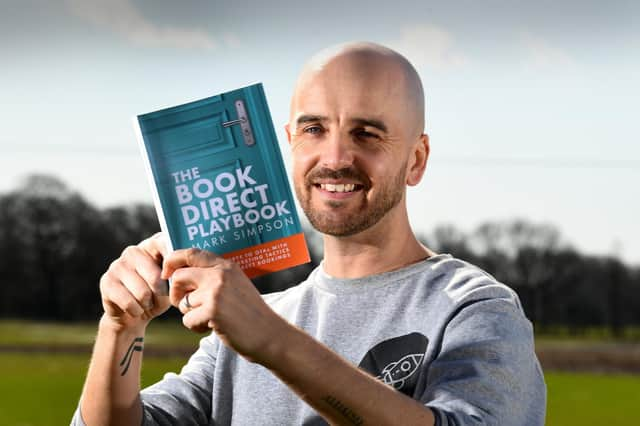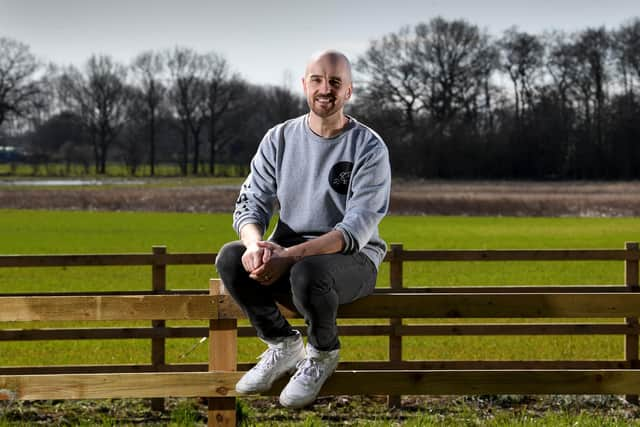North York Moors farm and hospitality background at The Grainary helped Boostly's Mark Simpson become direct booking expert


When the cows escape but you have a full room of customers waiting for breakfast, you find a way to deal with it – just ask Mark Simpson.
That’s how business is done in the joint farming and hospitality trades he was raised in, and an ethos he’s used ever since.
Advertisement
Hide AdAdvertisement
Hide AdMark runs Boostly, an online business which helps hoteliers achieve more direct bookings instead of relying on third parties – a trend which he says is proving costly for them and for Yorkshire as a whole.


He grew up in Harwood Dale between Scarborough and Whitby at The Grainary, the farm his parents John and Lynda bough and turned into accommodation.
After decades, the family sold the business in January last year and Mark, who had taken it over, now runs Boostly full time but has also written and released The Book Direct Playbook.
He says: “It still hasn’t sunk in properly because my dad’s still got a little bit of land and goes up pretty much every day - he’s a farmer till the end - even though they’ve bought a house in Scarborough.
Advertisement
Hide AdAdvertisement
Hide Ad“We transformed the farm into a bed and breakfast very early on. Ever since I can remember we were just having strangers on the farm,” he says.
“Growing up it was me and my two younger brothers and a younger sister. There was just always people there, always somebody to play with. I remember loving it because whenever a holiday came along, whether it was Easter or summer or whatever, there was always kids coming up on their school breaks.”
He helped his family to run the business, instilling him with the work ethic that he’s gone on to use in his own ventures.
“The thing about farming, and the thing about hospitality, is that it doesn’t matter what’s happening, you just get the job done. So you could be in the middle of breakfast, for example, serving on a full house of guests and then you could have all the cows escape. And you just find a way to get it done – and that happened a lot. I definitely feel like the ‘getting it done’ mentality being brought into what I do now is stemmed from that from a combination of growing up on a farm and being hospitality at the same time.”
Advertisement
Hide AdAdvertisement
Hide AdIn his late teens the Liverpool FC supporter realised he wasn’t going to go to university or be a football player –but he could teach people to play.
“My coach in sixth form was called Nigel Carlson and he started his own coaching company,” says Mark.
“The only reason he gave me the job was because I could drive and he needed me to drive around his head coach, who couldn’t drive. That’s literally the only reason why I got the job.”
Mark, who now lives near Pocklington, worked to get his FA coaching badges and was eventually offered part of the franchise.
Advertisement
Hide AdAdvertisement
Hide AdIn 2002, though, he embarked on a new experience.“We were doing our written exams for our badges. And on the wall, there was a big poster saying ‘Do you want to coach in America?’ I was like, yes. And that’s really what started me off on that path. And then a year later, I was flying out to Memphis for six months.”
Each week he travelled to different cities or states, spending most of his time in the south-eastern regions of the USA: Tennessee, Alabama, Arkansas and Louisiana. He was able to keep his franchise in the UK but went back to America for five or six months annually for four years. “I was going to a lot of places in the states where they had never even met a British person before,” he says, adding that his “golden armour” was the English accent.
“Southern hospitality is definitely a thing,” he says.
After that he spent two years travelling in Thailand and Australia, before taking up sales job at Yelp after moving to London. That’s where he met his wife Laura, with whom he has three boys, Alfie, Charlie and Frankie, aged three to nine.
Then he returned to the Yorkshire Coast in 2012 to take over The Grainary.
Advertisement
Hide AdAdvertisement
Hide Ad“My parents had had the business for 25 to 30 years and they needed to get it online. Everything was offline. Everything was just pen and paper. Everything was very typical Yorkshire farmer style - it was done on the cheap.
They wanted one of us to come into the business, one of the four siblings, and we just put our hands up. My experience in London was working at Yelp, where I was doing sales, but I was also learning loads about marketing.”
He took his experience from working in the capital and implemented it in the family business. “So we got them online, we utilized social media, we got into email and we learned all about how reviews work and all of that jazz and I just implemented it into the business and that was my role as well as doing a bit of everything else. I loved it, I was just obsessed with it. I got stuck into it and the results were fantastic.”
He was frustrated by the lack of guidance about online working available to businesses in Scarborough and the surrounding areas, though, and realised that many of his peers were reliant on third party websites/online travel agents such as Airbnb for bookings. The Grainary used such websites too, says Mark, but mainly for marketing purposes.
Advertisement
Hide AdAdvertisement
Hide AdMark set up the Hospitality Community Facebook Group, initially hoping to share is tips with locals in the trade. “Before I knew it, we had people from Germany, France, Spain, join and then America and then New Zealand, Australia. And now we’ve got over 6,000 members from all over the world who are active members of that free Facebook group.”
He started Boostly on his birthday, October 4, in 2016 and turned it into a limited company in 2019. Its website, podcast and social media pages teach businesses how to curb their online travel agent “over-reliance”, with free videos such as ‘Easiest way to get high rank on Google Search’, for one.
When hoteliers use third parties, he says, not only are they paying lots in commission but it means bookings, terms and the policies are under online travel agent rules. “I know people through Boostly that are about 85 per cent reliant on Airbnb for their income. So they are building their house on someone else’s land,” he says.
During Easter in 2016 he took part in a project asking people on Scarborough’s seafront how they booked their stay, finding that eight out of 10 were through an online travel agent. “We worked out that with an average commission cost for a hospitality business, if they were 80 per cent reliant on that (website), they could be spending easily £1,000 in commission costs every month. If there’s over 100 hospitality businesses just in say, North Bay and South Bay...we’re talking (huge) figures in money that is not hitting Yorkshire. So (potentially) tens of millions not hitting Yorkshire over a yearly basis and that’s just going in commission costs.”
But he could talk about all this until the cows come home. To find out more, visit boostly.co.uk.
Comment Guidelines
National World encourages reader discussion on our stories. User feedback, insights and back-and-forth exchanges add a rich layer of context to reporting. Please review our Community Guidelines before commenting.